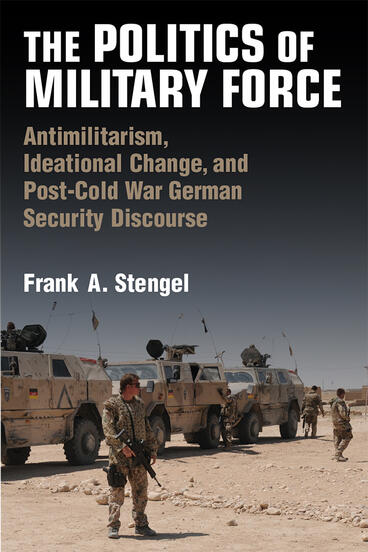The Politics of Military Force
Antimilitarism, Ideational Change, and Post-Cold War German Security Discourse
Examines the dynamics of discursive change that made participation in military operations possible against the background of German antimilitarist culture
Description
The Politics of Military Force examines the dynamics of discursive change that made participation in military operations possible against the background of German antimilitarist culture. Once considered a strict taboo, so-called out-of-area operations have now become widely considered by German policymakers to be without alternative. The book argues that an understanding of how certain policies are made possible (in this case, military operations abroad and force transformation), one needs to focus on processes of discursive change that result in different policy options appearing rational, appropriate, feasible, or even self-evident. Drawing on Essex School discourse theory, the book develops a theoretical framework to understand how discursive change works, and elaborates on how discursive change makes once unthinkable policy options not only acceptable but even without alternative. Based on a detailed discourse analysis of more than 25 years of German parliamentary debates, The Politics of Military Force provides an explanation for: (1) the emergence of a new hegemonic discourse in German security policy after the end of the Cold War (discursive change), (2) the rearticulation of German antimilitarism in the process (ideational change/norm erosion) and (3) the resulting making-possible of military operations and force transformation (policy change). In doing so, the book also demonstrates the added value of a poststructuralist approach compared to the naive realism and linear conceptions of norm change so prominent in the study of German foreign policy and International Relations more generally.
Frank A. Stengel is a Research Fellow in the Research Group on International Political Sociology at Kiel University, Germany.
Reviews
"Stengel’s greatest contribution is the demonstration that security policy discourse has had both an enabling as well as a limiting effect on Germany’s use of force, leading to Germany’s regular participation in foreign military missions, but with restrictions that often seem incomprehensible to Germany’s allies. This insight has implications for the importance of language and ideational creation, not only in the local German environment but also within the broader of context of transatlantic security as well."
- Joseph Verbovszky
—Atlantic Community
"Stengel’s book contributes to a growing body of literature that—correctly in my view—treats security policy change not as inevitable adjustments to a country’s changing environment, but as the result of political decisions that reflect value commitments, worldviews, and the expectations of the domestic public as well as allied states. Stengel’s contribution is theoretically sophisticated and empirically rich."
- Wolfgang Wagner
—Perspectives on Politics
Named one of Internationale Politik's Books of the Year 2022
"Frank A. Stengel explores the question of how the discourse on out-of-area operations unfolded against the background of a deeply rooted antimilitarism and elegantly embeds the German debate in domestic as well as transatlantic processes. A must-read for anyone seeking a deeper understanding of the change in German foreign policy."
- Internationale Politik
—Carlo Masala, Internationale Politik
Named one of Süddeutsche Zeitung's Books of the Year 2022
- Süddeutsche Zeitung
"Stengel’s book is an excellent read and a thought-provoking study into how security discourses emerge and how they change. Students of German politics, international relations and foreign policy will greatly benefit from this book and the detailed information it provides. It is very timely reading for observers and academics working in the field of IR and German Politics."
- Dr Antti Seppo
—Dr Antti Seppo, German Politics
"His extensive methodological chapters deliver a step-by-step primer of how to undertake rigorous analysis of political rhetoric. Taken on its own terms, Stengel’s book is carefully constructed and clearly reasoned, and it usefully demonstrates what a careful and systematic reading of rhetoric can—and can’t—accomplish."
- William G. Gray
—William G. Gray, H-Net, H-War
"Stengel’s book is one of the most competent applications of discourse theory in IR. It is strong not only in theory, but also in methodological and empirical rigor."
- Jakub Eberle
–Jakub Eberle, International Studies Review

